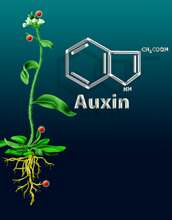How Your Garden Grows

Stumped scientists figure out plant growth mechanism
Just how does your garden grow? Plant scientists have long pondered the same question. For decades, the plant science community has known that auxins--a class of plant growth hormones--control many aspects of plant growth and development, including cell enlargement, formation of buds, roots, flowers, and fruit, and autumnal loss of leaves.
Image: Plant growth hormones, known as auxins, influence a variety of plant processes and are produced in growth regions throughout the plant (red dots). Researchers have worked out the series of molecular events the hormone uses to make plants grow. Credit: Nicolle Rager Fuller, NSF
Exactly how auxins do all that has been a thorny uncertainty, but now the molecular steps in the growth process have been worked out.
In the May 26 issue of the journal Nature, Mark Estelle and colleagues at Indiana University, Bloomington, show that to do its job, auxin must first bind with a protein called TIR1. When it's time to grow, the auxin-TIR1 complex signals for the destruction of another protein that puts the brakes on plant growth. With the brakes off, growth genes become active, and the plant gets a boost.
"This long-sought after discovery represents an important advance in our understanding of fundamental biological processes," says Jane Silverthorne, program director at the National Science Foundation, which supported this research. "This advance in basic plant biology could also have important applications to developing improved crops."
Auxins and synthetic replicas are widely used commercially to produce more vigorous growth, promote root formation in plants not easily propagated by stem cuttings, control flowering and fruiting, retard fruit drop, and to produce seedless varieties of some fruit like tomatoes. As auxins are found in all members of the plant kingdom, this breakthrough will not only allow researchers to better understand plant growth and development signals, it may also lead to improved cultivation practices.
The research was also supported by the National Institutes of Health and the U.S. Department of Energy.
Source: NSF















